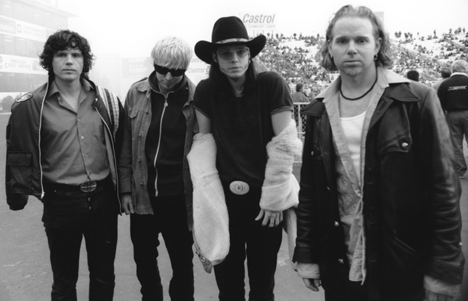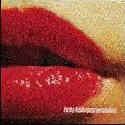




 | |
"I guess I
just wanted to go home," explains Ian Astbury, who has recorded Cream, the
first album with his new band HOLY BARBARIANS, in his hometown of Liverpool,
England. "It was a brilliant place", Astbury recalls. "Parr
Street studios, right in the center of Liverpool near Slater Street and the
Jackaranda Club. Loads of dark old Irish pups and newer places. We were going to
the bars and the club Cream every night it was open. The city is really alive.
There was so much going on because we were recording at the same time as the
Liverpool Music Festival and Crash FM had just started with Janice Long and Pete
Wylie. There was a tremendous sense of community. People were very sincere in
accepting us and that meant a lot. My family are from Birkenhead, so I went to
see them and could go and see Everton play eve other week. It also meant the
band could see where I'm from". If the other Holy Barbarians - Patrick Sugg
on guitar and brothers Scott and Matt Garrett on drums and bass respectively -
were truly going in his hometown of Liverpool,
England. "It was a brilliant place", Astbury recalls. "Parr
Street studios, right in the center of Liverpool near Slater Street and the
Jackaranda Club. Loads of dark old Irish pups and newer places. We were going to
the bars and the club Cream every night it was open. The city is really alive.
There was so much going on because we were recording at the same time as the
Liverpool Music Festival and Crash FM had just started with Janice Long and Pete
Wylie. There was a tremendous sense of community. People were very sincere in
accepting us and that meant a lot. My family are from Birkenhead, so I went to
see them and could go and see Everton play eve other week. It also meant the
band could see where I'm from". If the other Holy Barbarians - Patrick Sugg
on guitar and brothers Scott and Matt Garrett on drums and bass respectively -
were truly going
to see where Astbury was from, they would have a lot a traveling to do. Raised
in Liverpool, Glasgow and Hamilton, Canada Astbury's musical career has taken
kim from Yorkskire to the West Coast of America via London, Paris, New York and
a million one off nights. Astbury is a nomadic musician, thriving on the vibes
and experience available in different cities. Los Angeles may well have been his
home base during the most successful years of the Cult, but it has also squeezed
him away from his original musical intention. Of the Holy Barbarians, Ian says
"I had been back in England looking for a new gultarist to wvork with after
the Cult had broken up and I chatted to various people including Bernard Butler
and Adrian Oxoll from Sharkboy. I was looking for something new, but the people
I was meeting were working on other projects. So eventually I came back to L.A.
and decided to get on with it with the first person I got on with. I met Patrick
at a Wayne Kramer gig at the Dragonfly. He was working with Lucifer
Wong wich was a punk band featuring the guy who run the Fuct! clothing label,
and we were both passionate about music, so we got on with it. "We demo'd
songs in my garage which is just full of British paraphernalia like old Beatles
stuff and pictures of Everton and Cream is what we came up with. Patrick
contributed a lot. He had his own songs and chord structures that he wanted to
us. He is a very melodic guitarist. He's 25 and he's something like a cross
between Barnard Butler and Jlmmy Page. Then we built up the rest of the band;
Scott had been drumming with the Cult and then his brother, Matt, joined in and
we shaked up in this really old studio on North Vine for a fortnight. Stevie
Wonder and the Jackson Five and Marion Clay had all recorded there; it was
really dark and dingy, an old post office. Once we had put the song together
properly, I started to think where to record the album. I wanted to go home,
back to England. London seemed like it would be too much of a distraction and
Black Grape, Oasis, and the Roses were all working at Mommouth and I didn't want
to be seen as trying to hitch onto something there. Then I thought 'Why not
record in Liverpool and see my family and Everton at the same time?".As in
the past Astbury hasn't been afraid to change both his location and his
personnel but the split from longtime Cult partner Billy Duffy finds Ian's
distinctive vocals given a new backin. The Holy Barbarians have the raw feel of
a new band working together. There's a naivety to the work that Astbury believes
had long since been lost by the Cult. "Obviously I really love and care
about Billy, but for too long I went along without fighting for my musilcal
voice to be hear and eventually I had to get out. I don't care what happens
commercially with Holy Barbarians - if it doesn't sell big I can live with that
because I've had five years of that being the main concern. Now it's back to the
music and I am doing something I believe in. The Cult hadn't recorded in England
since the 1986 Electric album.
That got trashed before we re-did it with Rich Rubin. And recording in Liverpool
really got me excited again. Thre Cult had become too one-dimensional. When we
started we had been naive, idealist and provocative; we were going against the
grain by using guitars, we were making psychedelic music hen other people were
jamming around my pullovers being fey. We came to America and became taken in by
it. We were coming back exhausted and wanting to get fucked up all the time. A
lot of it became a blur. I had family problems, my father was ill and my
relationship wasn't right and all just obscured what we were originally about".
In 1990, as an aside from the demands of the Cult's success,Astbury set up the
ground breaking Gatherinng Of The Tribe event - bringing together musicians of
different styles, rap, rock, dance - a forerunner to the Lollapalooza tour. This
inspired Ian but by now the Cult had created a profile and it was difficult, and
perhaps commercially suspect, to step out of it".
"It was tough to leave that kind of lifestyle and music, that pressure to
continue what we had with the success of Sonic Temple. But I had wanted more. I
had recorded 'The Witch" with Rick Rubin which was more rhythm-based rather
than lead guitar led and that's the way I saw the Cult going, where as Billy had
locked into rock. We were still selling out shows and receiving good reviews and
were rebuilding bridges we had sometimes burnt. And I could just see it becoming
what it was before, so I decided to get the fuck out I wanted my music to be
organic, real. In 1983, I wrote a song called 'Spiritlvaller' and Southern Death
Cult didn't want to record it so I broke the band up. That song literally set
the template for 'She Sell Sanctuary' and muchr of thre Cult's success.
And now I'm breaking away again". Astbury's driving force was has often
been his passion for music. There's a surge of electricity once again running
through his conversation, his songwriting and live shows. He talks passionately
about today rather than dwelling on the past.
"People go on about Blur and Oasis being the Stones and the Beatles, but
they should let the past go. Those bands are good enough in their own right.
They shouldn't be tagged with the past. Our song 'Magick Christian" is
about putting all that behind us. People are still harping on about the Sixties,
about Bobby Moore lifting the World Cup, about the music, the freedom. The Arts
were in harmony in the sixties, but they are today as well. Trainsnspotting is a
good example. Pulp are too, as the Chemical Brothers. We should be reveling in
our own time. Let's stop comparing and going back. With the Holy Barbarians we're
going forward."

|

![]()